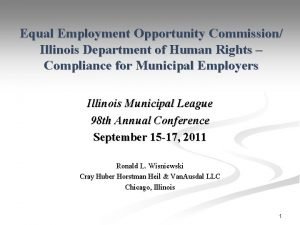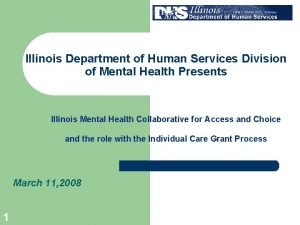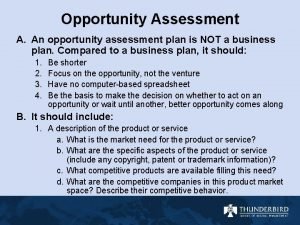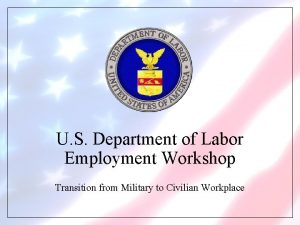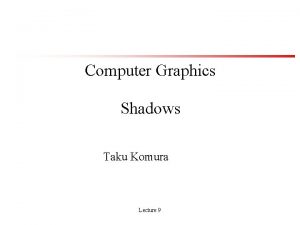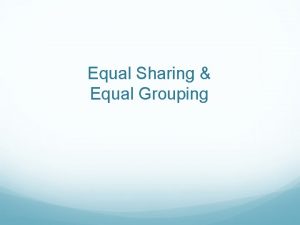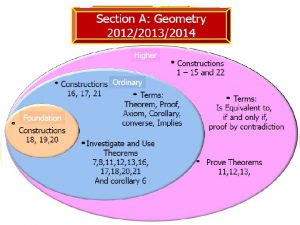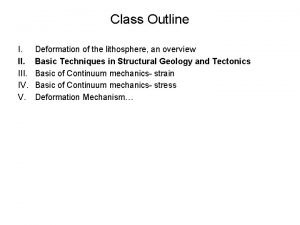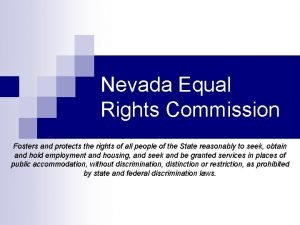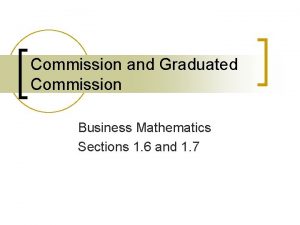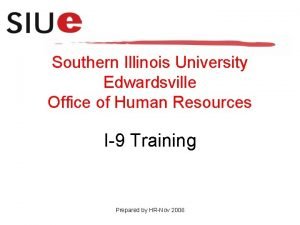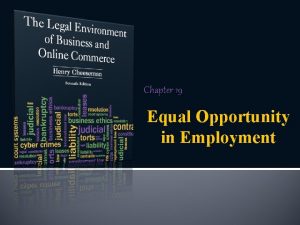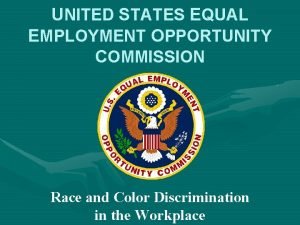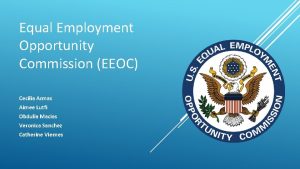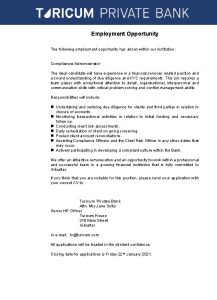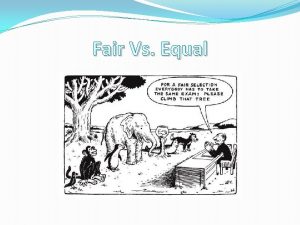Equal Employment Opportunity Commission Illinois Department of Human


















- Slides: 18

Equal Employment Opportunity Commission/ Illinois Department of Human Rights – Compliance for Municipal Employers Illinois Municipal League 98 th Annual Conference September 15 -17, 2011 Ronald L. Wisniewski Cray Huber Horstman Heil & Van. Ausdal LLC Chicago, Illinois 1

A. Equal Employment Opportunity Commission and Illinois Department of Human Rights 1. Equal Employment Opportunity Commission A. The Equal Employment Opportunity Commission (“EEOC”) is an independent federal agency created by Congress in 1964 to eradicate discrimination in employment as defined in federal antidiscrimination laws. Federal anti-discrimination laws are enforced by the federal EEOC. B. Federal anti-discrimination laws include, but are not limited to Title VII of the Civil Rights Act of 1964, the Age Discrimination in Employment Act of 1967 (ADEA), Title I of the Americans with Disabilities Act of 1990 (ADA), and the Equal Pay Act of 1963 (EPA). C. The EEOC has district offices throughout the United States which carry on most of the day-to-day enforcement activities of the EEOC. Each district office covers a specific geographic area, and most have satellite locations, known as area offices, that handle cases within a localized portion of the district. The district office covering Illinois is located in Chicago. 2

A. Equal Employment Opportunity Commission and Illinois Department of Human Rights 1. EEOC cont’d. D. The EEOC has authority to receive, initiate and investigate charges of discrimination filed against employers who have a statutory minimum number of employees. For municipal employers the minimums are essentially irrelevant as anti-discrimination laws apply despite the number of employees. The EEOC’s role in investigation is to fairly and accurately evaluate charge allegations in light of all evidence obtained. E. When a state or local agency exists, such as the Illinois Department of Human Rights (“IDHR”), the EEOC may defer its processing of a charge to allow the state or local agency to handle the case. The EEOC is not bound by the results of the state or local agency investigation, but it must give strong weight to any findings. F. In order to preserve the complainants’ federal rights, the IDHR automatically cross-files eligible employment charges with the EEOC, and conducts the investigation for the EEOC under the terms of the agencies’ Worksharing Agreement. 3

A. Equal Employment Opportunity Commission and Illinois Department of Human Rights 1. EEOC cont’d. G. If a Right-to-Sue Notice is requested from the EEOC, the IDHR encourages the complainant to withdraw her case at the IDHR. If a complaint with the same issues as those filed with the IDHR is filed in federal court and the complainant has not withdrawn, IDHR will suspend its investigation. H. If an employer receives a charge filed with a local agency or board, it should carefully review the local rules and procedures, since these rules will be applicable if the local agency investigates the charge. There are some differences, i. e. , 30 days to respond to an EEOC charge and 60 days to respond to an IDHR charge or risk default. 4

A. Equal Employment Opportunity Commission and Illinois Department of Human Rights 2. Illinois Department of Human Rights A. In 1979, the Illinois Human Rights Act (IHRA) created the Illinois Department of Human Rights (IDHR) and the Illinois Human Rights Commission (IHRC). B. The IDHR administers the IHRA, which prohibits discrimination because of race, color, religion, sexual orientation, national origin, ancestry, citizenship status (with regard to employment), familial status (with regard to real estate transactions), age, marital status, physical or mental disability, military service, unfavorable military discharge, order of protection status or any other protected class. C. It is also a civil rights violation to discriminate because of arrest record (in employment), to retaliate against someone because he/she files a charge of discrimination, or opposes discrimination, to aid, abet or coerce someone to discriminate, to coerce, intimidate, threaten or interfere with any person in the exercise or enjoyment of their housing accommodation, or to interfere with the Department or Commission's duties. 5

A. Equal Employment Opportunity Commission and Illinois Department of Human Rights 2. IDHR cont’d. D. Claimants could file charges for violation of the IHRA before the IDHR seeking a decision on the claim. The IHRC would review IDHR decisions and adjudicate civil rights complaints before an administrative law judge. E. The IHRA amendments, effective January 1, 2008, gave the Circuit Court of Illinois jurisdiction over suits for employment discrimination, as defined in the IHRA, including retaliation for engaging in a protected activity. Prior to that employees only had limited access to State Courts. This applied to charges filed after January 1, 2008. F. After filing a charge with the IDHR a claimant may elect to commence a civil action with a jury trial in the appropriate Circuit Court at various stages of the charge process for charges filed after January 1, 2008. 6

A. Equal Employment Opportunity Commission and Illinois Department of Human Rights 2. IDHR cont’d. G. The option is available upon notice: 1) Within the dates provided by the IDHR via notice mailed within ten days of the date on which the charge was filed, and again no later than 335 days thereafter. 2) After investigation, if the Director of the IDHR determines there is no substantial evidence to support the charge. The claimant must file suit within 90 days of notice. 3) After investigation, if the Director determines that there is substantial evidence to support the charge. The claimant must file suit within 90 days of notice. 4) If the IDHR has not issued its report within 365 days after the charge is filed, or any such longer period agreed to in writing by all the parties. The claimant must file suit within 90 days of these dates. 7

A. Equal Employment Opportunity Commission and Illinois Department of Human Rights 2. IDHR cont’d. H. Employment Law Claims That May Be Brought in State Court: n Violations as defined in the IHRA relating to employment law: actual damages (to include emotional harm and mental suffering), hiring or reinstatement, back pay, benefits, attorneys’ fees and costs, and interest on actual damages and back pay; n Retaliation under the IHRA: actual damages (to include emotional harm and mental suffering), hiring or reinstatement, back pay, benefits, attorneys’ fees and costs, and interest on actual damages and back pay; n Illinois common law and retaliatory discharge actions: a plaintiff may seek punitive and compensatory damages, without caps like Title VII, and attorneys’ fees; or, n A civil rights violation, including retaliation, under Title VII of the Civil Rights Act: actual damages, hiring or reinstatement, back pay, benefits, attorneys’ fees and costs. Compensatory and punitive damages are capped, depending on the number of employees that the employer employs. [Punitive damages can only be recovered against an individual defendant and not a municipality. ] 8

B. Ramifications of the Failure To Comply With EEOC/IDHR Regulations Under the IHRA Previously, only Federal Courts or the IHRC dealt with these cases in Illinois. Plaintiffs’ attorneys are, with increasing frequency, foregoing administrative remedies in order to get their clients’ cases in front of Circuit Court juries. Plaintiffs’ attorneys are now suggesting that the EEOC and IHRC administrative process be abolished in favor of attorney affidavits similar to those submitted in medical malpractice cases. This can be disadvantageous to employers for the following reasons: 1. More claims are being brought in Circuit Court: In the years prior to the amendment, less than 10% of the IDHR's completed investigations resulted in a finding of substantial evidence. Under the pre-2008 law, unless a complainant succeeded on a request for review, a finding of no substantial evidence ended the case. Under the Post-2008 IHRA, complainants who receive a finding of no substantial evidence can still go to Circuit Court. This is slowly but steadily increasing the number of IHRA complaints being filed in Circuit Court even with findings of no substantial evidence to support the charge. 9

B. Ramifications of the Failure To Comply With EEOC/IDHR Regulations Under the IHRA 2. Litigating in Circuit Court lands IHRA claims in front of juries, as well as judges who are unfamiliar with employment law. Juries are unpredictable; therefore, few employers relish the prospect of defending employment claims before a jury. However, complainants who choose to pursue their IHRA claims in Circuit Court will have the right to request a jury, whereas IHRC cases are decided by a hearing officer. Furthermore, most Circuit Court judges’ experience with employment claims is likely limited to the rare Title VII claims that are filed in Circuit Court and not removed to Federal Court. Thus, compared to hearing officers in the IHRC, Circuit Court judges are largely unfamiliar with employment law and certain civil rights claims, i. e. , violation of due process claims, etc. 10

B. Ramifications of the Failure To Comply With EEOC/IDHR Regulations Under the IHRA 3. More extensive discovery in Court than before the IHRC. When IHRA claims are before the IHRC, the parties can propound interrogatories and requests for production. However, depositions are allowed only by agreement of the parties upon leave of the hearing officer for good cause shown, and requests for discovery depositions are almost never granted. When IHRA claims are filed in State Court, the standard Illinois rules of discovery will apply, thus limiting the number of interrogatories and allowing depositions. Employers are likely to be pleased to have a limit on the number of interrogatories and to have the opportunity to depose the complainant and his or her witnesses. However, employers and their witnesses will likewise be subject to depositions resulting in the expenditure of additional time, resources and money. 4. Plaintiffs will attempt to block removal to Federal Court by naming individuals defendants. If an IHRA claim is filed in Circuit Court and if complete diversity exists, employers can remove the case to Federal Court in certain situations involving harassment, where the judges are more familiar with employment law. Complainants, on the other hand, may believe that they will fare better before a Circuit Court. In an effort to keep the case in Circuit Court, employees may attempt to destroy complete diversity by naming individuals, such as supervisors, as defendants. 11

B. Ramifications of the Failure To Comply With EEOC/IDHR Regulations Under the IHRA 5. Plaintiffs generally have more success in State Court. It is also generally true that it is more unlikely a Circuit Court judge will grant a motion for summary judgment as compared to Federal Court judges. This will result in more cases making it past summary judgment to a jury where large verdicts are common. The opposite is generally true in Federal Court. Plaintiffs have been shying away from Federal Courts with certain employment cases although recent changes to employment laws may reverse that trend. 6. While compensatory damages (for emotional distress, pain and suffering, etc. ) are progressively capped depending on the number of employees under Title VII, they are not capped under the Illinois Human Rights Act. The administrative law judges are much less likely to award large dollar amounts for such damages. A State Court jury on the other hand is much more likely to do so. 12

B. Ramifications of the Failure To Comply With EEOC/IDHR Regulations Under the IHRA 7. Increased defense costs associated with IDHR claims in Circuit Court versus the IHRC. These amendments are resulting in a slow but sure increase in the number of IHRA claims that employers must defend beyond the charge stage. The defense in Circuit Court will be more expensive in Circuit Court versus the IHRC. The scope of discovery will increase resulting in higher defense costs. 8. Beware of the IHRA default provision. If the IHRA charge is not answered with a verified response within 60 days or the respondent does not cooperate with the investigation without showing of good cause, the IHRA may take a default against the respondents that may impact the case in the Circuit Court. It is critical to ensure a proper investigation of and response to the charge be filed by the respondents. Time is of the essence, as is a thorough and complete investigation when the claims are brought to the attention of the Municipality is critical. The defense of the case could be compromised by the time the lawsuit is ever filed, the Illinois Municipal League is notified of the lawsuit and an employment law defense attorney is engaged to defend the case. 13

C. EEOC and IDHR Compliance Measures to Avoid Ending Up In State or Federal Court 1. BE RESPECTFUL AND CONSIDERATE WHEN DEALING WITH MUNICIPAL EMPLOYEES. 2. COMMUNICATE WITH ITS EMPLOYEES AND MAKE SURE THEY KNOW THE MUNICIPALITY’S POLICIES AND PROCEDURES. 3. REVIEW AND UPDATE THE MUNICIPALITY’S EMPLOYEE HANDBOOK AND/OR POLICIES. 14

C. EEOC and IDHR Compliance Measures to Avoid Ending Up In State or Federal Court 4. CONDUCT ANNUAL EMPLOYEE EVALUATIONS. 5. - IMPLEMENT AN EFFECTIVE ANTI-DISCRIMINATION AND ANTI HARASSMENT POLICY – INCLUDING TRAINING. 6. ESTABLISH A CLEAR DISCRIMINATION AND HARASSMENT REPORTING PROCEDURE. 15

C. EEOC and IDHR Compliance Measures to Avoid Ending Up In State or Federal Court 7. DOCUMENT EVERYTHING IN A SINGLE EMPLOYEE FILE. 8. TAKE ACTION AND INVESTIGATE PROMPTLY. 9. LEARN HOW TO HIRE AND HOW TO FIRE. 16

C. EEOC and IDHR Compliance Measures to Avoid Ending Up In State or Federal Court 10. DO NOT RETALIATE! A. The municipality cannot do anything to the employee that would dissuade her from making or supporting a charge of discrimination. Before taking action against an employee who has filed a charge ask yourself that question. B. Avoid suddenly enforcing a policy. C. Avoid over-supervision after a complaint. D. Avoid disciplining out of anger after a complaint. E. Maintain the status quo after a complaint a charging employees’ conduct is so egregious that this is impossible. 17

Equal Employment Opportunity Commission/ Illinois Department of Human Rights – Compliance for Municipal Employers Ronald L. Wisniewski Cray Huber Horstman Heil & Van. Ausdal LLC 303 West Madison, Suite 2200 Chicago, Illinois (312) 332 -8450 rlw@crayhuber. com 18
 Equal opportunity illinois
Equal opportunity illinois Illinois mental health collaborative
Illinois mental health collaborative Schedule a hiring authority 5 cfr 213,3102(u)
Schedule a hiring authority 5 cfr 213,3102(u) An opportunity assessment plan is
An opportunity assessment plan is Equal opportunity fund
Equal opportunity fund Equal opportunity and the law chapter 2
Equal opportunity and the law chapter 2 Illinois department of rehabilitation
Illinois department of rehabilitation Department of labor employment workshop
Department of labor employment workshop Equal height equal light
Equal height equal light Equal height equal light
Equal height equal light What is equal sharing and equal grouping
What is equal sharing and equal grouping Opposite angle
Opposite angle Meridionalnet
Meridionalnet Kara jenkins nevada
Kara jenkins nevada The secondary education commission
The secondary education commission Graduated commission example
Graduated commission example Siue human resources
Siue human resources Entrepreneurial opportunity in human services
Entrepreneurial opportunity in human services Hr inventory meaning
Hr inventory meaning
